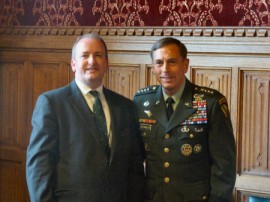
An interesting debate in Westminster Hall yesterday on the United States of America included an interesting exchange of views between two Conservative MPs, Mark Pritchard (who introduced the debate) and Mark Field. (Read the debate here.)
Mark Pritchard, who is a fairly mainstream Eurosceptic, extolled the virtues of the USA (not wrongly) but struggled to square that with his opposition to the EU:
“In the American State Department, the Pentagon and elsewhere in Washington DC, including in the previous and current White House Administrations, is a shared view that a united Europe is good news for America’s national security, for its treaty obligations under NATO and for reducing the likelihood of future conflicts in Europe. I understand that view, but it is fundamentally flawed.”
Not only the previous administration supported European integration, but in fact administrations going all the way back to the launch of the Marshall Plan in 1947, except for a rather confused period under George W Bush (which you can read about here). It is unusual, even for a Eurosceptic, to praise the geopolitical vision of George W Bush over that of Truman, Eisenhower, Kennedy, Reagan or Clinton.
Why did he take this view? He explained:
“I understand that a stable Europe is good news for America and Britain, but it is individual nation states, within Europe, that have stood with America in times of need. Never—not even in world war two—has there been a fully united European voice; there have only ever been the voices of nation states, some coming together.”
But this is a circular argument. Those times of need have arisen precisely because of the lack of a common European position. Historians are fairly well agreed that it was the possibility of different policies on the part of Britain and France that was a major factor in German strategies that led to war both in 1914 and 1938/9. Since then, the determination to find common policies in the face of common threats in defence of common interests has played a major part in keeping the peace of Europe and, thus, the peace of America.
In the Federal Union archives, you can find a pamphlet written by Keith Killby in 1942, “Peace – what then?” (which you can read here), in which he put it like this:
“Every country, now in the war, wished to avoid the German menace and tried to avoid war. Each changed its attitude from one of conciliation to one of a brave show of force many times, but very seldom did these brave shows of force coincide. Consequently Hitler was able to attack and overcome them one at a time. There can be little doubt but that if all the nations now occupied by Germany had withstood and attacked at the same time Germany would have been overrun as quickly as she overran the Low Countries. Or very likely if they had unequivocally stated their unity at the outset on this vital matter of solid common defence the Nazi attack would never have come. But this unity was not to be. Each nation first of all thought of itself and acted accordingly. On such a basis united and therefore effective and decisive action could never result. Even Britain and France were until the eleventh hour divided on a policy concerning the Nazi menace. That delay had its tragic influence upon the course of the war as we all know.”
Mark Field, by contrast, made a more interesting comment on the future of the relationship with America:
“Much as we have a good relationship with America, which is based on common language, and common history, it would be wrong to overstate the nature of that relationship. If we look at the large Hispanic population in America, and then spool forward a decade or so, I suspect that we will find few people talking about the special relationship between our two countries. Instead, American foreign policy will focus on its relationship with Europe.
“Although I instinctively agree with much of what my hon. Friend had to say about the importance of nation states, I also fear that the tremendous economic turmoil facing this country, and the world, will be with us for some years to come. We will hear increasing voices in this country—from across the political spectrum—calling for us to integrate with the power block in Europe. Remember, we eventually joined the EC in 1973 as a defence mechanism. We felt that the only way forward for this country was to latch ourselves on to Europe. That debate on our integration within an all-powerful European block will go on in the decades ahead. In the future, the world will be in blocks.”
In that light, the major question in the international sphere is how to arrange the relations between those blocks. A friendly relationship with America will be essential, but it will be managed best if Britain is part of Europe rather than attempting to go it alone.
